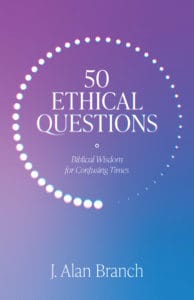
In this excerpt from 50 Ethical Questions: Biblical Wisdom for Confusing Times, J. Alan Branch introduces a basic framework for making ethical decisions as a Christian.
One afternoon, a minor incident presented me with a strong temptation to act unethically. I had driven to a small town near Kansas City for a guitar lesson and, afterward, walked from the guitar shop back across the street to get in my car. As I was putting my guitar in the backseat, my car’s partially opened door was caught by a gust of wind and blew all the way open, denting a brand-new minivan parked next to me, but doing no damage to my own vehicle.
What did I do? First, I looked around to see who was watching. Then I began to justify the incident by appealing to how common such an event is: “Everyone gets door dings. It’s just part of owning a car.” Then I began to blame the person driving the minivan: “They parked too close to me!” Then I began to grumble about life being full of problems: “Why did this happen to me? I’m a good guy!” This all sounds laughable now, and is even more so considering I’m an ethics professor!
I sat down in my car, ready to leave, and then remembered that even if no other human saw it, God saw me dent the van. I also realized my wife and children would be embarrassed of me if I drove away. Most painfully, the Holy Spirit was convicting me of the sin of avoiding responsibility for damaging someone else’s property. So, I waited. Soon, a beautiful family walked up and began to climb in the van. I got out, introduced myself to the dad, showed him the dent I’d put in his new minivan, and offered to have it repaired. He could not have been more gracious; he thanked me for pointing out the dent and then encouraged me not to worry about it.
In 50 Ethical Questions, I will address issues of much greater complexity than denting a stranger’s automobile. As we think through these issues, many of us are tempted to do what we think we can get away with—the equivalent of driving away. But Christians must not forget that ethical questions are fundamentally spiritual questions: the process of ethical reflection both affects and is affected by our relationship with Jesus Christ. More than merely giving the “right” answers on different issues, I hope this book will provide a framework that will help you to not just to think ethically but to draw closer to Christ.
A Christian Ethical Decision-Making Process
What process should individual Christians use in making moral choices? While the specific steps may differ from person to person and from one station in life to another, it is helpful to have a proposed method. Life is made of choices. The decisions we make write the narrative of our life and determine how we will be remembered. The most important thing in life for any of us is to discover God’s will and then to do it. Ethical decision-making is central to discovering God’s will for our individual lives.
Christian ethical decision-making emerges from a consistent pattern of following Jesus Christ as a disciple and walking in a manner consistent with God’s word and the example of Jesus. As 1 John 2:5b–6 says, “By this we may know that we are in him: whoever says he abides in him ought to walk in the same way in which he walked.” As we walk daily with Jesus in the light of Scripture, our mind is transformed (Romans 12:1–2) and we grow in our spiritual strength and discernment. As this occurs, we are better situated to make correct evaluations in cases of ethical decisions. In fact, many decisions we considered dilemmas in the past will no longer pose moral quandaries since we are becoming conformed to the image of God’s Son. Followers of Jesus should be willing to do what God says regardless of the consequences.
Prayer is always a vital step in any Christian’s ethical reflection. In the garden of Gethsemane, Jesus prayed fervently for the Father to give him strength and said, “Yet not what I will, but what you will” (Mark 14:36). Here we see the amazing mystery of the incarnation as Jesus—the eternal Son of God who took on human flesh—prayed for the Father’s will to be done. When faced with a difficult decision, we too should pray for God’s will to be done in our lives. Since the tendency of our fallen, sinful nature is to find the easy way out or to make a decision that favors our own pleasures over God’s will, Christ taught us to pray for victory over temptation: “And do not lead us into temptation, but deliver us from evil” (Matthew 6:13 NASB). We should also pray for discernment and godly wisdom, as Psalm 119:66 says, “Teach me good judgment and knowledge, for I believe in your commandments.” As we pray, we can be confident the Holy Spirit will help us. Some problems and decisions may seem so heavy we can’t find the words to pray nor do we even know how to ask God for wisdom. At those times, we can be confident “the Spirit helps us in our weakness. For we do not know what to pray for as we ought, but the Spirit himself intercedes for us with groanings too deep for words” (Romans 8:26).
To arrive at a proper moral conclusion, we should clearly define the problem at hand. Ethicist William Frankena stressed the importance of a clearly defined problem and said, “Very often when one is puzzled about what he or someone else should do in a certain situation, what one needs is not really any ethical instruction, but simply either more factual knowledge or greater conceptual clarity.” Many decisions require immediate answers, but when we are struggling to determine a Christian moral stance on a particular issue, often a great deal of time and research is needed to determine what is at stake. Resist the temptation to find quick, sound-bite answers to highly complex questions.
After praying and defining the problem, the next step is to ask, “Does the Bible specifically address the problem?” Since the Bible is God’s word, what it says on any issue is the most important point of consideration. For example, suppose a young man has a side job mowing lawns for which he is paid cash. At tax time, the question may arise, “Should I report all my taxable income? I was paid in cash and the government will probably never know.” Yet Romans 13:6–7 says we are to pay our taxes, so the clear biblical answer is to report all the income one earned in a year.
Seeking godly advice from mature Christians is another step in the process. Proverbs 12:15 emphasizes the importance of sound counsel: “The way of a fool is right in his own eyes, but a wise man listens to advice.” One of the reasons that we need to be involved in a local church is to have a resource of godly people from whom we can get advice when faced with a moral problem. Find people in your church who walk by faith and are committed to holiness and the lordship of Christ. We should listen closely if we are considering one course of action and godly counselors are telling us to go in a different direction. We can deceive ourselves into advocating an ungodly course of action for pragmatic reasons, and we need other Christians to speak into our lives and alert us to the possible perils of ill-advised ethical choices.
After studying Scripture and seeking wise counsel, pray again. If you are faced with an ethical choice in which the Bible is very clear, then present to God what his word says and pray to him for the courage to be obedient. In cases where there is no clear biblical injunction or prohibition, develop a list of alternative courses of action and relevant biblical principles, and then pray for God’s wisdom. James 1:5 promises: “If any of you lacks wisdom, let him ask God, who gives generously to all without reproach, and it will be given him.” Ask the Holy Spirit to teach you what to do, but remember the Holy Spirit will never tell you to do something contrary to God’s word. Ephesians 5:18 encourages us, “And do not get drunk with wine, for that is debauchery, but be filled with the Spirit.” The filling of the Holy Spirit gives us the help we need to make a wise choice when facing ethical decisions.
Eventually, you must make a decision and act on it. You may arrive at a decision that will cost you physically or financially if you do what God wants you to do. Shadrach, Meshach, and Abednego were ordered by Nebuchadnezzar to worship his golden statue, but they refused and said, “Our God whom we serve is able to deliver us from the burning fiery furnace, and he will deliver us out of your hand, O king. But if not, be it known to you, O king, that we will not serve your gods or worship the golden image that you have set up” (Daniel 3:17–18). They were thrown in the furnace, but God delivered them. John the Baptist faithfully declared God’s word to Herod Antipas and he was beheaded. In both cases, God was honored. In his providence, God may miraculously deliver us or he may allow us to suffer for the cause of Christ. Too often we want God’s choice to be the safe and convenient choice, but following Jesus Christ may lead us to make a decision that costs us in many difficult ways. Our call is to be obedient. “Obey God and leave all the consequences to him.”
This post is adapted from 50 Ethical Questions: Biblical Wisdom for Confusing Times by J. Alan Branch (Lexham Press, 2022).







